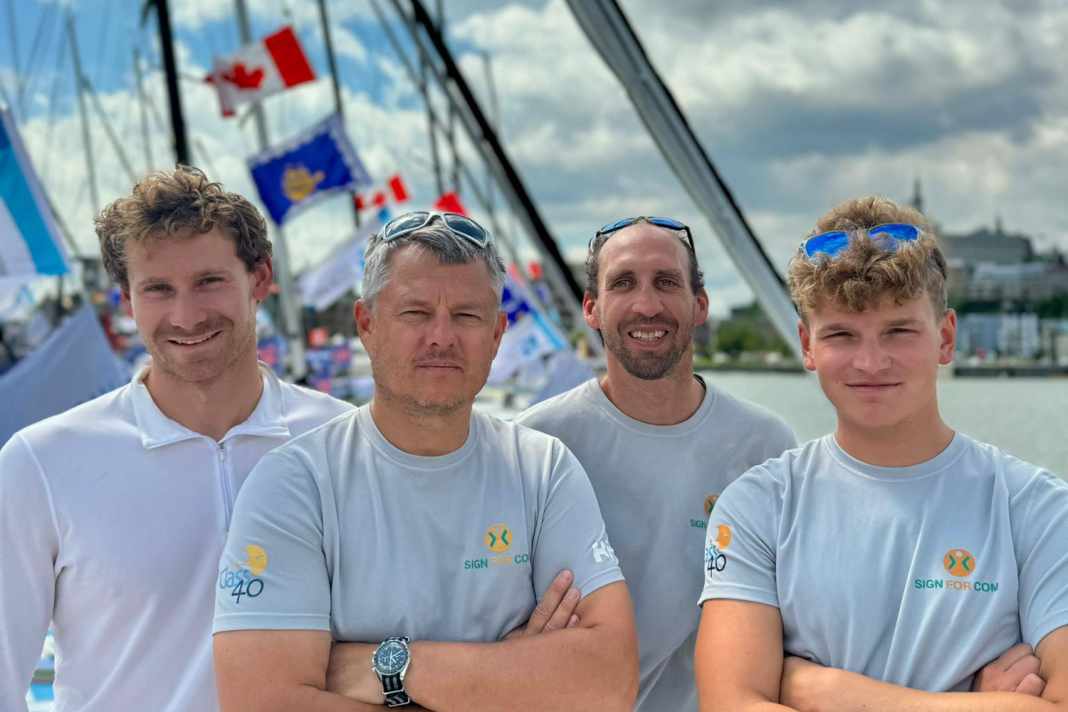Québec Saint-Malo: 40 years after the premiere - 10th Transat from Sunday with "Sign for Com"
Tatjana Pokorny
· 29.06.2024






This Transat begins on a river: the starting shot for the 10th Transat Québec Saint-Malo will be fired on Sunday in Québec City on the St Lawrence River. Against the picturesque backdrop of the old harbour district of Vieux-Québec, the fleet will sail up the river and into the North Atlantic via the Cabot Strait. This initial section of the Transat is characterised by strong currents and tides that require precise navigation.
Transat Québec Saint-Malo: Comeback of a classic
The fact that the classic Transat Québec Saint-Malo, which has been held since 1984, has not been heard of for a long time is due to the fact that, like the Olympic Games, it is only held every four years. The 2020 edition was cancelled due to the Covid pandemic. The last time the race was held was eight years ago. Now the Transat challengers are celebrating their comeback. First and foremost the best Class 40 crews, who make up the main field with their 24 boats.
With the premiere of the Transat Québec Saint-Malo in 1984, the initiators commemorated the 450th anniversary of the first voyage of the navigator and explorer Jacques Cartier from Saint-Malo. He had reached the St Lawrence River in 1534. Then, as now, the race takes its participants a total of around 3,000 nautical miles across the Atlantic to the destination harbour of Saint-Malo in France. The current fleet will start the Atlantic marathon on Sunday at 2 p.m. local time in Canada.
The best in class are at the start
It is the highlight of the year for the large Class 40 field. The best in class are at the start. These include the teams led by Transat Jacques Vabre winner Ambrogio Beccaria on "Alla Grande Pirelli" and compatriot Alberto Riva on "Acrobatica". Other strong contenders are the teams led by Nicolas D'Estais on "Café Joyeux", Amélie Grassi on "La Boulangère Bio", Ian Lipinski on "Crédit Mutuel", Erwan Le Draoulec on "Everial" or Alberto Bona on "Ibsa Group", Fabien Delahaye on "Legallais" and Guillaume Pirouette on "Sogestran - Seafrigo".
Simon Koster is a great role model" (Melwin Fink)
Lennart Burke, Melwin Fink, Hendrik Witzmann and Simon Koster set off on their first joint Transat Québec Saint-Malo with an aggressive attitude. The young co-skippers Burke and Fink have deliberately brought a lot of experience on board: "Simon Koster is a strong sailor in the Class 40 and a great role model. I bought my first Mini from Hendrik Witzmann back then," says Melwin Fink.
The German quartet with Swiss reinforcements has ambitious plans for the leap across the Atlantic. At the same time, Lennart Burke, Melwin Fink and their experienced team-mates know what a complex challenge they have to master. Melwin Fink said shortly before the start: "We are expecting very unstable weather for the start. We will have to sail out of the river for about three days. We will probably experience all kinds of wind there ... The weather is not very stable."
24 Class 40 starters at the anniversary edition
Melwin Fink continued: "Then we will hopefully sail downwind across the Atlantic. The forecast looks good for that, so we could have a lot of pressure in between. The last few miles could be very exciting again if we arrive in the English Channel with light winds and a strong tide and finish in front of Saint-Malo."
What could be in it for the four-man crew in sporting terms? "The placings are difficult to predict. All 24 boats are top teams with very good sailors. The standard is once again very high. But of course we want to finish as high up the field as possible. We will give it our all and fight for it," said Melwin Fink in Québec. The answer to the question of the top favourite comes quickly: "Once again, it's Ambrogio Beccaria!"
The fact that Class 40 yachts now characterise the racing events in the Transat Québec Saint-Malo was not always the case. When the regatta celebrated its premiere in 1984, just a few weeks earlier the English Transat Ostar had brought many adventure-hungry sailors to Newport, who also had their sights set on the return race from Québec. At that time, yacht designers and shipyards were competing to build ever larger and more powerful ships: A dozen of the 13 multihulls were longer than 20 metres.
Jörg Riechers holds the second-fastest Class 40 time
Today, the race record for the Transat Québec Saint-Malo in the Class 40 is 11 days, 17 hours and 30 minutes. It was set by Miranda Merron's team in the eighth edition in 2012, just behind the second-placed team led by Jörg Riechers from Hamburg on "Mare" in the same edition twelve years ago after 11 days, 19 hours and 1 minute with the second-fastest Class 40 time for the Transat Québec Saint-Malo to date. In view of the small quantum leap that the development of the Class 40 fleet has taken in the meantime, new best times are to be expected.

